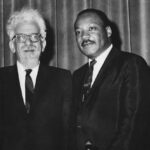Psalm 42: Text and Commentary

Jay and Leslie Cohen Professor of Judaic Studies
Emory University, retired
Atlanta, Georgia
A Jewish Perspective
On Psalm 42
In the section of Heschel’s influence, I wrote about how Heschel’s writing and life gave form to my own writing and life. For many years, I have been translating and commenting upon Psalms. Heschel would have understood that. To honor his memory, I would like to gift my translation and commentary on Psalm 42.
Psalm 42 is a pilgrimage psalm. However, it is one that was written by someone who could not go on the pilgrimage. Perhaps he was ill, or forcefully detained by enemies. It is a prayer for all those of us who have sorely missed communal worship. And, it must surely reflect the feelings of Jews held as hostages by Hamas even as I write these lines.
Psalm 42
Text and Commentary
1For those who cannot attend communal prayer1
2As a deer yearns for streams of water
So does my soul yearn for You, God.2
My soul thirsts for God, for the living God
When will I come and be in the Presence of God?3
4My tears have been bread for me, day and night,
As they said to me all day, “Where is your God?”4
5These things do I remember, and pour out my soul over me:
When I passed by in the wagon —
When I accompanied them to the house of God —
With the sound of singing and thankfulness —
A celebrating crowd.5
6“Why do you bend low, my soul?
And put pressure on me?
Have hope in God, for I shall give thanks to Him again —
Salvation is being in His Presence.”6
****
7Lord, my soul bends low over me
Therefore, do I call You to mind
From the Jordan,
From the Hermon mountains,
From the lesser peak.
8Deep calls unto deep,
The sound of waters roaring in their courses.
Your waves and Your breakers
Sweep over me.7
9By day, the Lord commands His loving-kindness
And, at night, His song is with me –
A prayer to the God of my life.8
10I say to God Who is my Rock,
Why have You forgotten me?
Why do I go about despondent
at the burden of the enemy?
11With murder in my bones,
My enemies curse me
Saying all day, “Where is your God?”9
12“Why do you bend low, my soul?
And why do you put pressure on me?
Have hope in God, for I shall give thanks to Him again —
Salvation is in my presence and in the Presence of my God.”10
- 1) The psalm clearly has two parts: verses 2-6 and 7-12, set off by a refrain (verses 6 and 12). The verses on the outer margin (2, 7-8, 10-11) are addressed to God. The verses on the first indent margin (3-5 and 9) are addressed to the reader. And verses on the second indent margin (6 and 12) are addressed to the psalmist’s inner self. ↩︎
2) Verses 2 and 3 give us two of the most famous images in biblical literature: the soul yearning for God as an animal yearns for water, and the soul thirsting for God. Note the shift in address from second person (v. 2) to third person (v. 3) even though the theme of the soul yearning for God remains the same. This switch is common in biblical poetry. ↩︎
3) Heb., ve-‘eira’eh pnei Elohim; literally, “And I will be seen [by] the Face of God.” It is the traditional language for the pilgrim’s experience. The original Hebrew may have been ve-‘er’eh, “And I will see…” but the biblical writers thought that that left open the possibility that some statue might be considered to be God. By changing the vowels but not the consonants, they turned the verb into passive form (“I will be seen”). “Face” is one of the most powerful images in human life. Babies stare at their mothers’ faces when they nurse. The incapacitated elderly track human faces as they cross through their field of vision. Seeing, or not-seeing, God Face-to-face is central to the religious experience of the Bible. I have chosen to translate pnei Elohim sometimes as “Face of God” and sometimes as “Presence [capitalized] of God.” ↩︎
4) Not only can the psalmist not go on pilgrimage to worship but the people around him are mocking him because he cannot go, and that has made his tears into his daily bread. It could be that the psalmist is being held against his will. It could also be that he is too old or too sick to go, and he envisions that people are mocking him. The motif occurs again, more strongly, in verse 11. ↩︎
5) The imagery depicts the joy of pilgrimage and the psalmist’s memory of it. “Wagon” (Heb., ba-sakh) from sukka, a covered hut; hence, a wagon with a covering. Alternate: the covered hut in which one rests overnight: “when I entered the covered hut.” “I accompanied them” (Heb., eddaddem) perhaps from n-d-d; hence, “to wander, to travel.” Note the final phrase, without a verb. ↩︎
6) The psalmist addresses his inner self saying that hoping for a better time is better than a depressing burden. “Put pressure on me” (Heb., va-tehemi alai). In biblical Hebrew, the soul or the heart sighs, moans, and groans. “Salvation is being in His Presence” (Heb., yeshu`ot panav) with yeshu`ot as the plural abstract noun, and panav, “His Face,” as “His Presence”; hence, the addition of “being in.” Again, note the pilgrimage motif. ↩︎
7) The Hermon mountain range is in the north of the Holy Land; it is the sources of the Jordan river. The waters come pouring down in waterfalls and cascades during the winter and early spring. The psalmist mixes the sounds of the waterfalls with the waves and breakers of the sea here and elsewhere in Psalms. “The lesser peak” (Heb., har mits`ar) seems not to be the name of a mountain. ↩︎
8) A beautiful aside to the reader. ↩︎
9) The psalmist returns to the theme of his despondency at not being able to go on pilgrimage and be with God Face-to-face except that this time he addresses his anger directly to God. It is a protest to God and not a contemplation shared with the reader (v. 4). The Hebrew is also stronger: be-rétsah be-`atsmotaí heirefúni tsoreraí, “With murder in my bones, my enemies curse me”; meaning, ‘with murderous intent toward my body.’ ↩︎
10) Heb., yeshu`ot panai ve-elohai, literally, “salvation is [in] my face and my God.” This is a repeat and expansion of v. 6 to specify that both parties, the psalmist and God, must be present. Hence: “Salvation is in my presence and in the Presence of my God.” For a similar usage of the refrain, see Ps. 49: 13, 21. ↩︎
Endnote: As I began to write these lines, we were seven months into the coronavirus pandemic. Many people, especially those who were more elderly, including myself, had been severely cautioned not to attend communal worship. For almost a year, I, who used to attend religious services frequently, had not been with my community, even for the Rosh ha-Shana (the Jewish New Year) and Yom Kippur (the Day of Atonement). A Christian friend put it this way, “Participating in a Zoom worship service is like watching a movie of a burning fire.”
